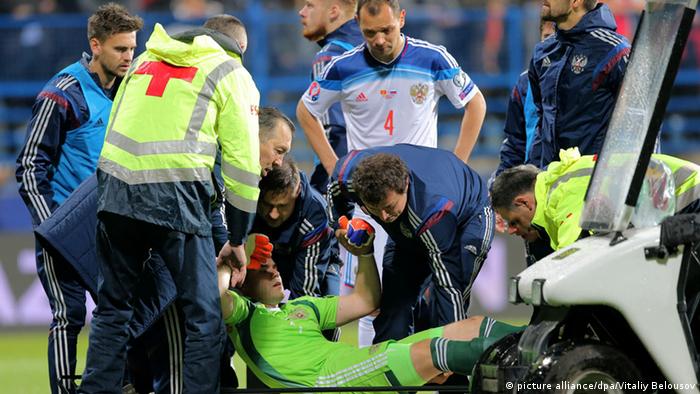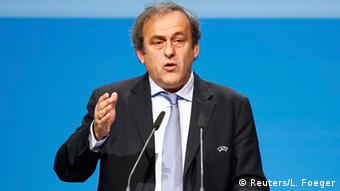Russia launches protest after abandoned Montenegro match
Russia's soccer federation has said it has launched a protest with UEFA
over a decision to continue a Euro 2016 qualifier after its goalkeeper
was hit by a flare. The game was later abandoned after more crowd
trouble.
The president of the Russian Football Union, Nikolai Tolstykh told
Russian media outlets on Friday that he had lodged a protest shortly
after Friday's match against Montenegro in Podgorica was abandoned due
to crowd trouble.
"In our view, the game should have been stopped in the first minute," Tolstykh told the Sport Express newspaper.
Tolstykh was referring to an incident which occurred just seconds after the opening kickoff, when Russian goalkeeper Igor Akinfeev was struck in the back of the head by a burning flare. Akinfeev collapsed to the ground and was carried off on a stretcher, before being taken to the hospital for treatment.
German referee Deniz Aytekin called both teams off of the pitch for more than half an hour before the UEFA delegate at the match decided that the game should continue.
However, there was more trouble after Aytekin awarded a penalty to Russia in the 67th minute, which was saved by the Montenegrin keeper.
Shortly afterwards Dmitry Kombarov became the second player to be struck by an object thrown from the crowd and a scuffle broke out between the two teams. The game was then abandoned with the two teams scoreless. It wasn't immediately clear what action would be taken as a result.
"UEFA will wait to receive reports from the delegate and referee to open disciplinary proceedings," a statement posted on the website of soccer's governing body in Europe.
After the game, Montenegro's coach, Branko Brnovic apologized for the actions of his team's supporters.
"I apologize to the Russian players and staff for everything that's happened. It is no surprise that the game was abandoned after the second incident," he told Montenegro's RTCG public television.
Previous trouble
This was not the first incident of serious crowd trouble in qualifying for the Euro 2016 tournament in France. In October, a match between Serbia and Albania had to be abandoned after a drone carrying a flag depicting the territory of a "greater Albania" flew into the stadium in Belgrade. A scuffle broke out between the two teams after a Serbian player pulled down the flag. A pitch invasion by Serbian fans also ensued, with some attacking the Albanian players.
Platini's warning
The recent incidents of crowd trouble at European football matches has not gone unnoticed by UEFA. The governing body's president, Michel Platini, touched on the issue earlier this week, when he was re-elected unopposed at UEFA's annual congress in Vienna.
Platini recalled the disaster at the Heysel stadium in 1985 when he was a player for Juventus in the final of the European Cup. Thirty-nine people, mostly Italians, were killed with a wall collapsed after Liverpool fans charged Juventus supporters before kick-off.
"In recent months, we have all been struck by certain images that I thought were a thing of the past. Some of us experienced that past at first hand. In my case, it was exactly 30 years ago," Platini told the congress.
"I therefore renew my call for greater awareness of this issue among the public authorities, so that we can avoid reliving the dark days of a not-so-distant past - a past where hooligans and all manner of fanatics called the shots in certain European stadiums."
pfd/sms (dpa, Reuters, AP, AFP)
"In our view, the game should have been stopped in the first minute," Tolstykh told the Sport Express newspaper.
Tolstykh was referring to an incident which occurred just seconds after the opening kickoff, when Russian goalkeeper Igor Akinfeev was struck in the back of the head by a burning flare. Akinfeev collapsed to the ground and was carried off on a stretcher, before being taken to the hospital for treatment.
German referee Deniz Aytekin called both teams off of the pitch for more than half an hour before the UEFA delegate at the match decided that the game should continue.
However, there was more trouble after Aytekin awarded a penalty to Russia in the 67th minute, which was saved by the Montenegrin keeper.
Shortly afterwards Dmitry Kombarov became the second player to be struck by an object thrown from the crowd and a scuffle broke out between the two teams. The game was then abandoned with the two teams scoreless. It wasn't immediately clear what action would be taken as a result.
"UEFA will wait to receive reports from the delegate and referee to open disciplinary proceedings," a statement posted on the website of soccer's governing body in Europe.
After the game, Montenegro's coach, Branko Brnovic apologized for the actions of his team's supporters.
"I apologize to the Russian players and staff for everything that's happened. It is no surprise that the game was abandoned after the second incident," he told Montenegro's RTCG public television.
Previous trouble
This was not the first incident of serious crowd trouble in qualifying for the Euro 2016 tournament in France. In October, a match between Serbia and Albania had to be abandoned after a drone carrying a flag depicting the territory of a "greater Albania" flew into the stadium in Belgrade. A scuffle broke out between the two teams after a Serbian player pulled down the flag. A pitch invasion by Serbian fans also ensued, with some attacking the Albanian players.
Platini's warning
The recent incidents of crowd trouble at European football matches has not gone unnoticed by UEFA. The governing body's president, Michel Platini, touched on the issue earlier this week, when he was re-elected unopposed at UEFA's annual congress in Vienna.
Platini recalled the disaster at the Heysel stadium in 1985 when he was a player for Juventus in the final of the European Cup. Thirty-nine people, mostly Italians, were killed with a wall collapsed after Liverpool fans charged Juventus supporters before kick-off.
"In recent months, we have all been struck by certain images that I thought were a thing of the past. Some of us experienced that past at first hand. In my case, it was exactly 30 years ago," Platini told the congress.
"I therefore renew my call for greater awareness of this issue among the public authorities, so that we can avoid reliving the dark days of a not-so-distant past - a past where hooligans and all manner of fanatics called the shots in certain European stadiums."
pfd/sms (dpa, Reuters, AP, AFP)


No comments:
Post a Comment